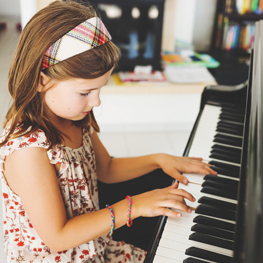
Whether you live with a young, strategic chess player, a budding hockey player, or an aspiring actor, you’ve probably pondered the best way to encourage your child’s natural gifts and abilities. When is the right time for your child to begin lessons? How can parents encourage persistence, without pushing? And is it even possible to balance the interests and pursuits of all the kids in your care?
Turns out, how parents approach the development of kids’ passions and interests has a big influence on their long-term happiness; Harvard research shows that participating in hobbies as a child is linked to increased happiness in adulthood. Read on for age-by-age guidance on helping kids find and enjoy their natural gifts.
Early Years: 0 to 5
Adore it? Explore it
New parents are flooded with options for early classes and activities for their child, from pee-wee soccer to music class to toddler ballet. But now is not the time to focus on skill development, says parenting coach Whitney MacDonald, M.Ed., a former educator and athletic coach who founded creatingmen.com. Instead, early childhood is a time to immerse your child in real-world experiences and observe what ignites their interest and excitement. Swap out structured classes and sports teams for less structured, more exploratory experiences like toddler gym, family swim, library story time, naturalist-led hikes, live theatre, music performances, and museum exhibits that align with your child’s interests.
Some parents fear that skipping out on toddler classes might hurt their child’s early academic development. In fact, the opposite may be true, says Maria Castelluccio, who leads the academically advanced Léman prep school: “Open-ended exploration of the arts forms the foundation of early literacy: reading, writing, and language development,” she says. “Exposing your child to music and visual art at a young age develops unique opportunities for self-discovery and creativity.”
Elementary Years: 6 to 12
Lesson Learned
In early elementary school - Grades 1, 2, and 3 - activity exploration should still focus on fun, says Whitney MacDonald. Around age 10, though, many kids are ready to begin formal lessons, provided that their participation is fueled by their own interest, and not by parental pressure. It’s important to find the right coach or instructor for your child, one who emphasizes the importance of practice over performance, injects a sense of fun and playfulness and communicates well with parents. When an instructor or coach promises to turn your child into a concert pianist, a competitive swimmer, or a vocal superstar, steer clear.
Lessons can carry an additional commitment to practice - and practice can be accompanied by whining, procrastination, and parental frustration. Keep practice sessions brief and plan them for periods when your child’s focus is likely at its best: After breakfast on a weekend, not after a long day at school. When a child is truly resistant to practicing, consult with the instructor about ways to encourage progress without piling on pressure. And consider that your child might not be ready for lessons, after all.
Teen Years: 13 to 18
Equal Measure
By the time kids reach high school, they’ve often hit their stride in their activity or activities of choice, juggling academic commitments with team sports, lessons, practice, and performances. When families have more than one child, parents juggle scheduling, transportation needs, and financial commitments for a number of different pursuits. And because the time and money required for different activities can vary widely, one child’s talent might steal the spotlight.
When it comes to investing time and money in kids’ activities, parents of siblings should think about equity, not equality, says Whitney MacDonald. While the time required for kids’ different pursuits might not ever balance out perfectly, it’s important to make each child feel like they are equally valued in a parent’s eyes. “It’s about saying, ‘Okay, your sister has this dance thing, but I’m going to make dedicated time just for you.’ The child has to feel that inner gesture, and to know that they’re just as important as their sibling because all children ultimately want connection with and recognition from their parents.”
Malia is a freelance writer specializing in parenting and health.
Calgary’s Child Magazine © 2024 Calgary’s Child